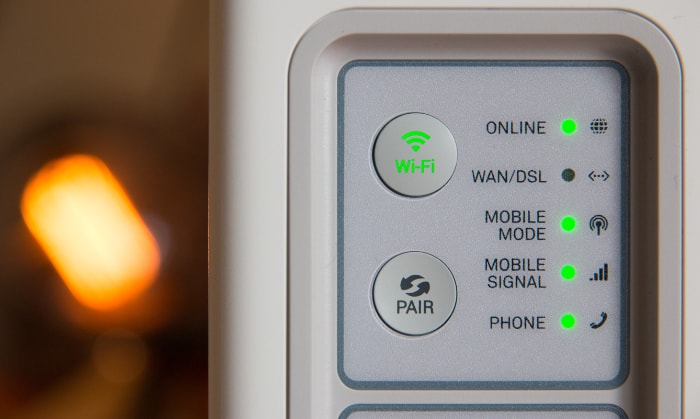Can Search History Appear on WiFi Bills?

It's no surprise that many people are concerned about their online privacy, especially when it comes to the information they access and search for on the internet.
Whether you're conducting research for work or school, browsing social media, or shopping online, you want to feel confident that your online activities are private and secure.
However, with so many different devices, networks, and service providers involved in our internet use, it can be challenging to know who has access to what information. This is especially true when it comes to Wi-Fi bills, which many people may not fully understand.
In this post, we will attempt to answer the question of whether or not you can see your search history on your Wi-Fi bill and provide some insight into how you can protect your online privacy.
How Wi-Fi (Internet) Bills Work
Wi-Fi bills typically charge for the internet plan that you have subscribed to. This means that you will be charged a fixed fee each month for the level of service and speed that you have chosen.
Your Wi-Fi bill will usually include the cost of your internet plan and any additional fees or charges that may apply, such as taxes or equipment rentals.
Your Wi-Fi bill does not typically include a record of websites you have visited or searches you have made.
In most cases, your Wi-Fi bill will simply show the total amount you owe for your internet plan and any additional charges. It will not provide a detailed breakdown of the specific websites that you visited or searches that you made during that time.
Can Your Wi-Fi Router See Your Search History?
A Wi-Fi router does not have the capability to see your search history directly. However, it can possibly see the websites that you visit.
When you use the internet, your device sends a request to the router to connect to a website or service.
The router then forwards the request to the internet through your internet service provider (ISP). When the website or service responds, the router receives the data and sends it back to your device.
While the router is forwarding these requests and responses, it can see the destination website or service and the information that is being sent or received.
However, it cannot see the specific pages or searches that you are making on those websites or services.
The router can only see this information while it is being transmitted over the network. It cannot see the information stored on your device, such as your search history or other personal data.
Additionally, some routers have logging or monitoring features that can keep a record of the visited websites. This information is usually stored on the router itself and can be accessed by someone with physical access to the router or by logging into the router's administrative interface.
However, these features are not enabled by default on most routers, and it is up to the user to enable them if desired.
Can Your Internet Service Provider (ISP) See Your Search History?
Internet service providers (ISPs) can potentially see your search history if the websites you visit are not encrypted. ISPs are responsible for connecting you to the internet and providing you with the internet service you subscribe to.
As a result, they have access to the data transmitted over their networks.
Nonetheless, ISPs are typically not allowed to reveal this information to third parties without your consent or a valid legal request.
In most cases, they are required to collect and retain certain information, such as IP addresses and connection times, for a certain period of time as part of their normal operations.
This information is used for various purposes, such as maintaining network performance, troubleshooting technical issues, and detecting and preventing fraudulent or illegal activities.
Additionally, ISPs may be required to provide this information to law enforcement or other authorities if legally requested.
For example, they may be required to provide information about your online activities in response to a subpoena, court order, or other legal requests.
Overall, it's essential to be aware that your ISP may have access to certain information about your online activities. If you are concerned about your online privacy, you may want to consider using encrypted internet connections or other measures to protect your data.
How to Encrypt Your Internet Connection

There are some ways that you can encrypt your internet connection and protect your data from being accessed by your internet service provider (ISP) or others. Here are five options that you can consider:
Use a Paid VPN
A virtual private network (VPN) like NordVPN is a tool that encrypts your internet connection and routes your traffic through a secure server. By doing this, it helps to protect your data from being accessed by your Internet Service Provider (ISP) or others on your network.
NordVPN, like many other VPNs, offers additional features, such as a kill switch, which cuts off internet access if the VPN connection drops to ensure your data isn't exposed. It also supports split tunneling, allowing you to decide which apps go through the VPN and which don't, providing a balance between speed and security.
Free VPNs may not provide the same level of security and privacy as paid VPNs, like NordVPN. Indeed, some free VPNs have been known to sell user data to third parties.
Therefore, it's advisable to opt for a paid VPN, as it is more likely to offer robust data protection, more features, and a better overall user experience.
Use End-To-End Encrypted Messaging Applications
End-to-end encryption means that your messages are encrypted from the time that you send them until the time that they are received, and only the sender and recipient have the keys to decrypt them.
This can help to protect your data from being accessed by your ISP or others who may be able to intercept your messages as they are transmitted over the internet.
One popular end-to-end encrypted messaging application is Signal. Signal is a free and open-source messaging app that uses strong encryption to protect your data.
It is available for Android, iOS, and desktop devices, and it offers a range of features, such as group messaging, voice and video calls, and the ability to send photos and files.
Signal is widely regarded as one of the most secure messaging apps available, and security experts and privacy advocates endorse it.
Use HTTPS
When you visit a website using HTTPS, your connection to the website is encrypted and secure. This is important because it helps to protect your personal information and data from being intercepted by third parties while it is being transmitted.
It also helps to prevent man-in-the-middle attacks, in which a third party tries to intercept and alter the communication between two parties.
You can tell if a website uses HTTPS by looking at the address bar in your web browser. If the URL begins with “https://” rather than “http://”, it means that the website is using HTTPS. You may also see a lock icon or other indicator in the address bar to show that the connection is secure.
Not all websites use HTTPS; some may only use it for specific pages or features. For example, a website may use HTTPS for its login page but not other pages.
To ensure the best level of security and privacy, it's always a good idea to look for the lock icon and make sure you are using HTTPS whenever possible.
You may follow these steps to set up HTTPS as the default in your browser.
Use the Tor Browser

The Tor browser is a special browser that routes your traffic through a network of servers, making it more difficult for your ISP or others to track your online activities. It is especially useful for accessing websites that may be blocked or censored in your location.
However, the Tor network can be slow and may not provide the same level of security as other options.
Use Encrypted Email Services
If you use email to communicate sensitive information, you may want to consider using an encrypted email service, such as ProtonMail.
It encrypts your emails and attachments from end to end, making it more difficult for your ISP or others to access your data.
Overall, there are many different ways that you can encrypt your internet connection and protect your data. It's essential to consider which options make the most sense for your specific needs and be mindful of each option's risks and benefits.


